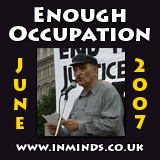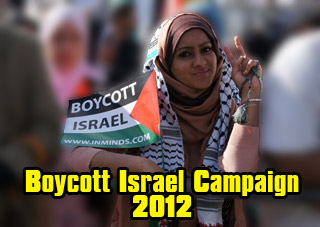
 Innovative Minds © 2014. All Rights Reserved. www.inminds.co.uk | ||||
Silence means a boycott is justifiedAmjad Barham, Education Guardian Israeli academics are not standing up for their Palestinian counterparts, and a boycott is the best way forward, says Amjad Barham
Israeli academics have been complicit in maintaining and supporting Israel's colonial and racist policies against the Palestinians. The academy has been in bed with political military intelligence since its inception, and is a critical node in the ideological scaffolding of the system of oppression.
Recently, Israeli academics have toured the UK to dissuade British academics from supporting a boycott against Israeli academic institutions. The Israelis have made two arguments against the boycott, both of which are seriously flawed. The first, as reported by the Israeli media, is that the boycott "defies the universal principle of academic freedom" and would hurt Israeli academics. The second, variants of which are routinely presented by apologists for Israel, is that Israeli academics are in the vanguard of dissent and are crucial forces for change; the boycott will only weaken them and thus is counterproductive. Such claims are at best disingenuous. As a Palestinian academic, I find the argument about academic freedom insensitive and offensive. Do Palestinian universities somehow fall outside the remit of the "universal" principle of academic freedom? The Israeli academics who argue for their unfettered access to international academic networks, grants, visiting professorships, fellowships and other benefits of the academic system, have paid scant attention to the total denial of the most basic freedoms to Palestinians, academics or otherwise. No association of university professors, academic senate, or professional body in Israel has ever protested the grotesque occupation, which destroys the lives and jeopardises the future of our students and faculties.
A survey conducted by the Israeli sociologist Yehouda Shenhav proves that between 2002 and 2004 (that is, at the height of the large-scale assault on Palestinian society by the Israeli occupation army), only eight of the 133 sociologists (6%) in the five largest universities in Israel took a moral stand against the occupation.
Aside from a courageous few, the vast majority of Israeli academics have been resoundingly silent when our universities have been shut by military orders, our access to them obstructed by concrete walls and barriers, and thousands of our students and colleagues jailed for resisting an unjust and internationally condemned occupation. In the Israeli academy, business as usual grinds on everywhere, and academics, in a startling show of insensitivity to their Palestinian counterparts, demand their right to enjoy the benefits and privileges of academic freedom without shouldering any of the responsibilities that come with freedom. The privileging of "academic freedom" above other, more basic, liberties flies in the face of the idea of universal human rights. How can the academic freedom of a sector of Israeli society be more important than the basic right to a free and dignified life for all Palestinians, academics included? There is more than a whiff of racism in the assumption that the academic privilege of Israeli academics is more valuable than the freedom of an entire people being strangled by an illegal occupation. The claim that Israeli academics have been a bastion of dissent or a force of opposition to state policies is simply untrue. In fact, Israeli academics have been complicit in maintaining and supporting Israel's colonial and racist policies against the Palestinians. The academy has been in bed with political military intelligence since its inception, and is a critical node in the ideological scaffolding of the system of oppression. Its members serve dutifully in the military reserves and offer "strategic analysis" and advice to military-intelligence agencies, to name only a few of the ways the Israeli academy is part and parcel of the structures of oppression. A survey conducted by the Israeli sociologist Yehouda Shenhav[1] proves that between 2002 and 2004 (that is, at the height of the large-scale assault on Palestinian society by the Israeli occupation army), only eight of the 133 sociologists (6%) in the five largest universities in Israel took a moral stand against the occupation; the same ratio was found among historians, and nine percent among philosophers. Only 4% of sociologists belonged to protest movements, while only 5% signed two different petitions in those two years. What holds for sociologists will be no different for academics in other disciplines. The bottom line is that the Israeli academy has not distinguished itself by taking a moral or a human stand against either the occupation or the racism practiced against Palestinian citizens of Israel. Israeli academics cannot take the moral high ground. The boycott can act as a wake-up call to Israeli academics and energise those among them who believe in the values of justice and equality to break their collective silence and join the forces fighting occupation and apartheid. Amjad Barham is head of the council of the Palestinian Federation of Unions of University Professors and Employees
[1]http://mrzine.monthlyreview.org/shenhav160606p.html#_ednref4 Source: http://education.guardian.co.uk/higher/comment/story/0,,2087130,00.html Also Of InterestPage URL: http://www.inminds.co.uk/article.php?id=10102
|
|
Support Us
If you agree with our work then please support us.Campaigns INMINDS Facebook Live Feed Latest Video's
INMINDS Twitter Feed Tweets by @InmindsComFeatured Video's
You need Flash player 8+ and JavaScript enabled to view this video.
[all videos (over 200)..] Featured MP3 Podcast  "The occupation can only end when pressure is applied from outside. Who is going to apply this pressure? The United States is not going to apply the pressure because Israel is its rotwiller, Israel is its local enforcement - a junior partner in the Middle-East, it is a special relationship - Israel is the US rotwiller. The British government is not going to stop it because the British government is the poodle of the United States, this is another special relationship. So who is going to apply it? We are going to apply the pressure. Civil society, ordinary people apply pressure by applying boycott - by boycotting Israeli goods, and exports, by boycotting tourism to Israel, by boycotting academic institutions which are part of the machinery of oppression and torture.." Israeli socialist dissident, Professor at Kings College London Enough Occupation Rally, June 2007 [3min / 2Mb] [all podcasts..] Newsletter Feedback |
 |
 |















































